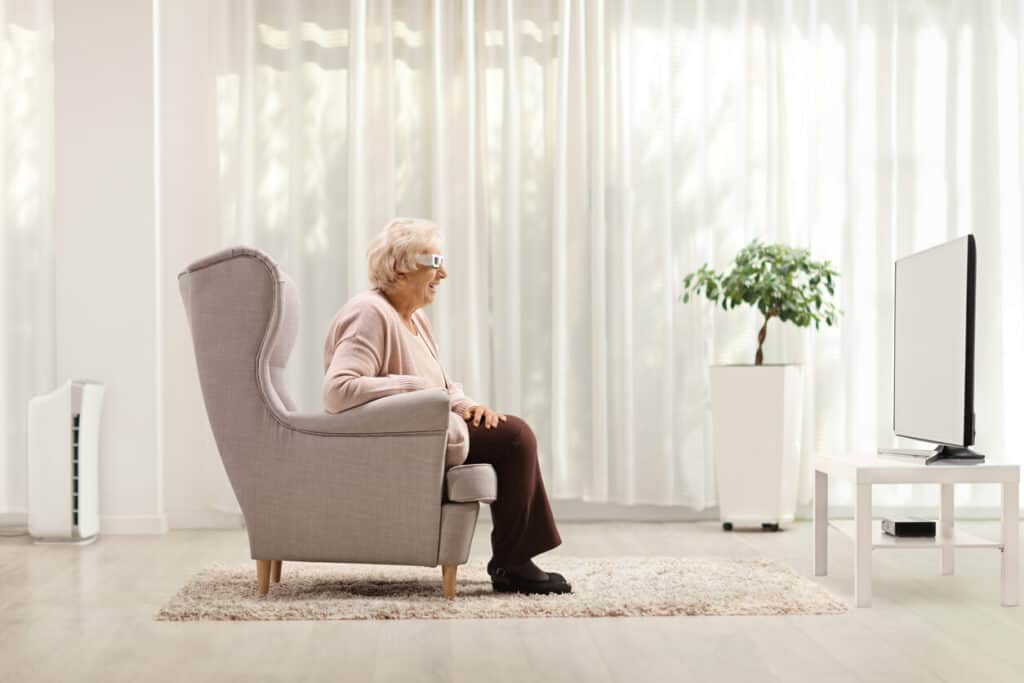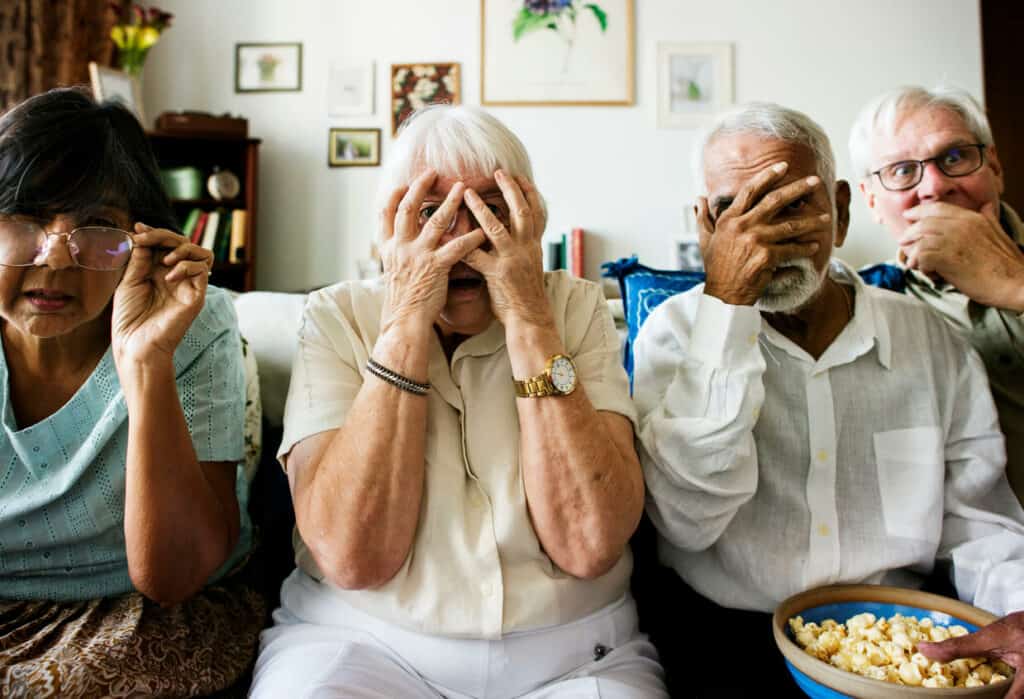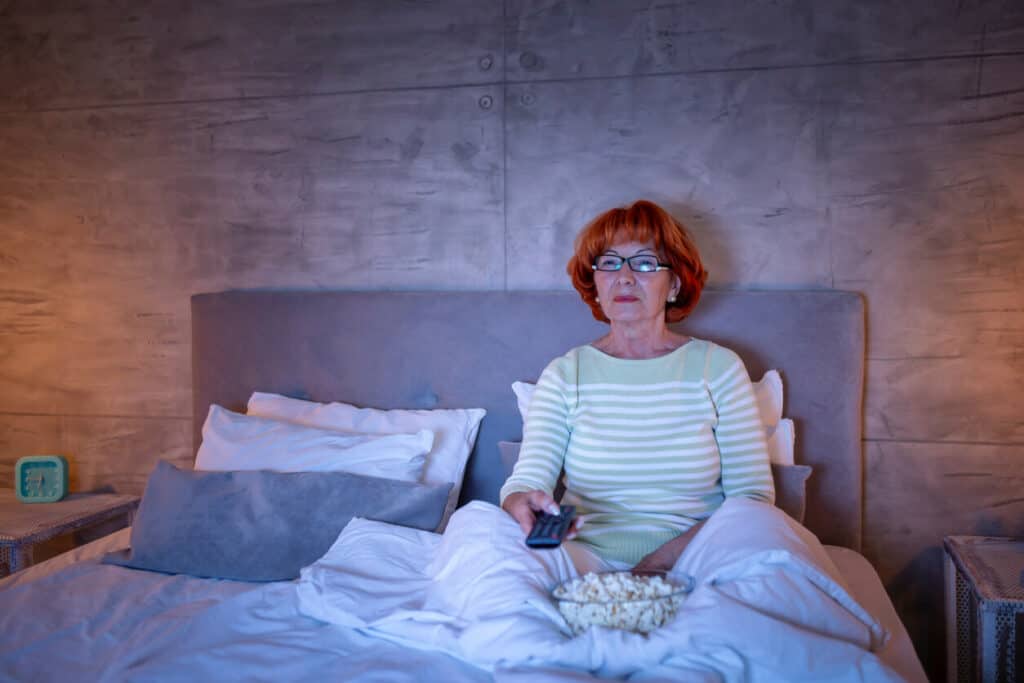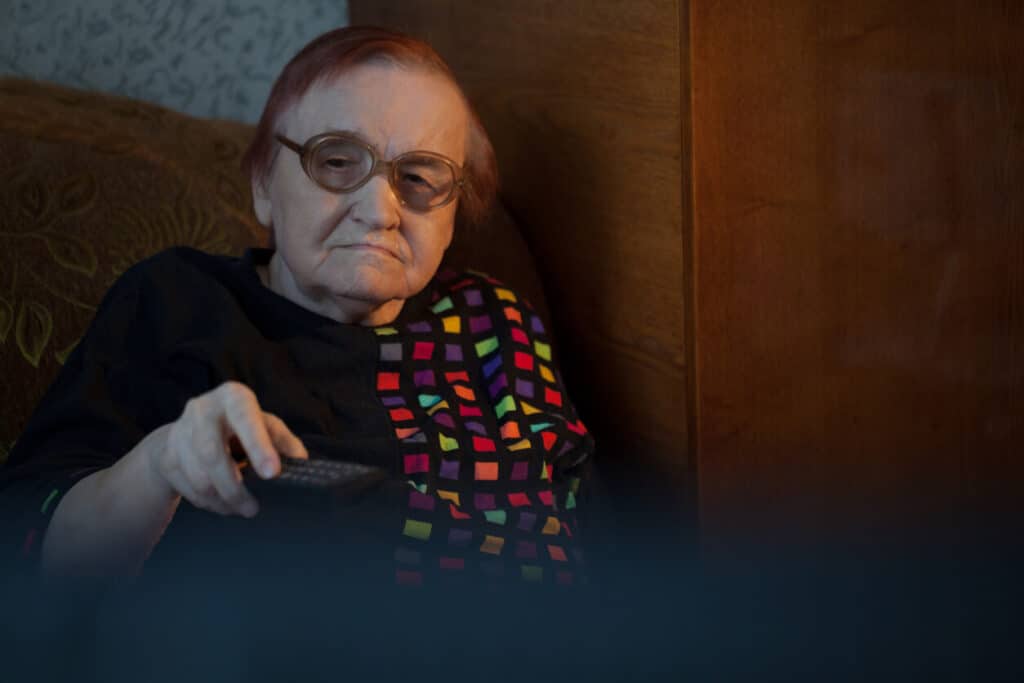
Television remains the number one media entertainment platform for young and old audiences alike. In fact, from 2021 to 2022, there were 122.4 million TV households in the US, according to Statista.
American seniors find many benefits in watching their favorite shows on TV. It’s a form of relaxation, enjoyment, and a way to get information and be up-to-date with the latest news. TV viewing has become an irreplaceable pastime for many seniors, but it also poses health risks that will make your loved one want to give it up as a hobby.
In this article, learn how and why watching too much television is bad and know some healthy alternative activities you and your loved one can do off the screens.
Research suggests that on average, seniors in the United States watch three hours of television per day. The pursuit of active living is crucial for seniors‘ health and well-being, and too much television can be detrimental to this goal. In 2023, as more seniors age, it’s important to consider the amount of time they spend sitting in front of the TV.
Is TV Bad for You?
Did you know that too much screen time has debilitating effects on health? Not only for seniors but also for the general population. Over 3½ hours of watching TV per day is considered excessive and can lead to an increased risk of chronic diseases, according to experts.
Watching TV per se isn’t bad. But nowadays, the content shared on most TV channels, especially news, is almost always about violence, crimes, pandemics, government problems, etc.
Watching television is bad if you keep seeing these negative things because they can harm mental well-being, especially for older and younger family members with unstable mental states that are particularly receptive to the negativity shown on TV.
It’s difficult to unsee the terrible things you see on the screens. While watching the news helps you be aware of what’s happening worldwide, it can also potentially make your loved one anxious and stressed.
Why Is Watching TV Bad for You?

TV is just like any other tool. How you use it will determine if it’s bad or good for you. At large, watching TV for two hours a day is safe. More hours than this leads to a sedentary lifestyle. Here are the top reasons why indulging in TV may be bad for your loved one’s health.
- Watching TV promotes a poor and inactive lifestyle. Seniors who remain seated for hours in front of a TV are at a higher risk of weight gain, cardiovascular diseases, and shoulder and back pain. Watching too much TV can also affect mobility. One study cited that older adults aged 50 to 71 who watched TV for five hours or more were 65% more likely to develop a walking disability after 10 years.
- Binge-watching TV affects mental health. How bad is TV for you? Binge-watching promotes a sedentary behavior that has a ripple effect on many other aspects of health. For example, being at home all day can isolate you from friends and reduce the quality of your social life. Additionally, watching disturbing shows about crimes and wars can cause emotional fallout, leading to stress and anxiety.
- Binge-watching encourages an unhealthy diet. One reason why TV is bad for you is it inclines you toward fast foods and unhealthy take-outs. Instead of cooking a healthy lunch, you preferably would pick up a phone and order from a nearby fast food restaurant because you don’t want to miss or pause an episode of what you’re watching. A healthy diet is essential for mental health, but you would rather compromise your health than miss an episode of your favorite show.
- It can also lead to sleep deprivation. This is the most obvious and immediate adverse effect of watching too much TV. Did you know that nearly 9 in 10 American adults have lost sleep because of binge-watching? Watching several episodes of your favorite service in one sitting stimulates and excites the brain. When the brain is in this state, it will be nearly impossible to stop watching.
- It also affects vision. Blinking rehydrates the surface of the eyes, but when you watch too much TV, you blink less, which leads to dry and irritated eyes.
What Happens if You Watch Too Much TV?

At a glance, TV seems like a harmless activity, but it is as harmful to the brain as smoking or obesity. Watching too much TV can change the brain.
- People who spend most of their sitting period watching TV have a 24% increased risk for dementia. Watching TV is a passive cognitive activity requiring little to no thinking and discourages activity in the brain.
- Those watching too much TV have a decreased gray matter volume in the brain. Gray matter is a part of the brain responsible for multiple brain functions, such as vision, muscle control, and emotions. People in their 40s, 50s and early 60s with moderate to excessive TV viewing habits had a reduced volume of gray matter and a more significant cognitive decline in their 70s and 80s.
- Watching too much TV overstimulates the brain. Overstimulation can lead to a decline in focus and a shorter attention span, affecting how you learn.
How Much Television Is Too Much
Watching TV between 30 minutes to two hours each day is fine. It would be much healthier if you could further reduce the time spend on it. Here are some indications that you and a loved one are watching too much TV.
- You start and end your day by watching TV.
- You can’t wait for the next episode.
- You decline invitations from friends to socialize because you want to stay home and watch TV.
- When you’re stressed or upset, you watch TV.
- You lose sleep due to watching TV.
A new study published in a prominent journal found that, on average, seniors watch three hours of television per day, which can lead to issues such as obesity, decreased mobility, and social isolation.
Older people need to engage in an active lifestyle that, as much as possible, excludes or minimizes TV viewing in their daily routine. If your loved one needs help creating, planning, and implementing a healthier routine that involves physical activities, in-home care services are an option. You can contact a caregiver to help monitor your daily routine and hours of TV viewing.
Too Much TV? Here Are Safer and Healthier Alternatives

Instead of spending an entire day in front of the TV, seniors can pursue active living by engaging in community activities, spending time with children and grandchildren, or taking up a new hobby.
Lazing out in the afternoon in front of your TV is a waste of precious time. These selected meaningful activities can help you or your senior mom or dad stay active and healthy.
- Read a book. Reading is an active cognitive activity compared to passively watching TV. Many seniors love to read, and most modern popular shows, series, and films are either based on books or have book versions.
- Learn how to play a musical instrument. It may be a cliché recommendation, but learning how to play a guitar or piano is more beneficial, productive, and entertaining to the brain than TV viewing.
- Study a language. If being bilingual appeals to your loved one, you can sign them up for language classes in your area or online. A language class delivered on screen is more beneficial than watching TV because it’s an active mental task requiring multiple cognitive skills, such as thinking, memory, and problem-solving.
- Turn a hobby into a source of income. Many seniors in their 60s or 70s work part-time jobs to earn extra income during retirement. If your loved one has a hobby that can be turned into a side income stream, such as painting, knitting, and writing, it could be a more meaningful way of spending time than watching TV.
- Become a volunteer. Another excellent option with a positive effect on social life is participating in local volunteering activities, such as tree planting, running for a cause, etc. Your loved one can socialize, meet friends, and connect with people with the same interests.
Watching TV isn’t entirely bad for your senior parent’s health as long they know how to limit the time spent on it. One tip to control viewing time is implementing a TV schedule in your home. For example, you or your loved one can only watch TV in the evening for a max of two hours.
We’ve used this strategy at our assisted homes so residents enjoy off-the-screen activities during the day, such as gardening and art classes, and get adequate, restful sleep at night.
When Is Watching TV Bad for You?

Watching TV is a good after-dinner idea and weekend get-together activity if you keep it within a healthy limit. If too much television becomes disruptive to the health of your loved one and gets in the way of completing their daily tasks, it is no longer a harmless hobby.
While it’s okay to enjoy a movie or two each week, seniors should be mindful of the amount of time they spend in front of the screen. Subscribing to high-quality video services that have enormous menus, such as Netflix or Amazon Prime, can make television and movie accessibility too easy.
Don’t watch TV for more than two hours a day. If you ever caught a loved one having a hard time walking away from the TV screen, suggest meaningful things to make good use of your time.
Encourage your loved one to join social events organized by your local senior centers to motivate them to spend their downtime on things with meaning. Otherwise, find a caregiver to help them organize a healthy daily schedule and explore activities that skip the use of screens.
In summary, pursuing an active lifestyle is the best way for seniors to live fulfilling lives in their golden years.






